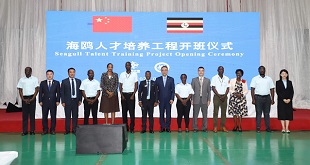
Players question UNBS’ ability to enforce standards
| THE INDEPENDENT | Dealers in solar home systems that do not meet the newly completed standards face prosecution and fines under the amended law.
The Uganda National Bureau of Standards recently released the new standards – US IEC TS 62257-9-8 and IEC TS 62257-9-5:2018 –and covers all Plug-and-Play (PnP) solar home system (SHS) and other renewable energy kits of up to 350W including pay-as-you-go kits. The new standards are expected to take effect July this year once the trade minister gives a go ahead.
David Ebiru, the acting executive director at UNBS said the new standards stipulates that all the information, claims and advertised features in all product literature including quality and performance must be true and accurate, and that the minimum warrantee for the system or SHS kit should be 2 years and 1 year for appliances.
“All components – modules, charge controllers, batteries, lamps, and others must meet or exceed quality and performance requirements specified in the standard,” he said.
“The light brightness or output (Lumen maintenance) of lamps must not fall below 90% of their initial value (brightness when new) after 2000 hours of operation,” he added.
Ebiru said all electrical or electronic appliances must also meet relevant and applicable consumer health and safety requirements specified in the standard.
This means that batteries must not contain hazardous substances such as Mercury or Cadmium. However, no clear amount of fine has been laid bare to the public.
These new standards, according to UNBS, are meant to protect businesses from competition from fake and counterfeit products, build confidence in solar product’s market as consumers’ access only high quality and durable systems and ultimately enhancing the country’s participation in international trade.
This development comes at the time the demand for solar home systems is gaining momentum in the East African nation, particularly in the off-grid areas where approx.80% of the population live.
However, the increase in demand and supply of these solar systems have also come up with numerous challenges including flooding of unsafe, shoddy and substandard systems and kits on the Ugandan and the neighbouring markets.
Uganda Solar Energy Association (USEA), an umbrella of solar dealers, said in a survey carried out in 2018 that at least three or four solar energy solutions on the Ugandan market are substandard, and thus have a shorter lifespan.
Similarly, a study co-authored by Aleid C.Groenewoudt in 2020 dubbed ‘From fake solar to full service: An empirical analysis of the solar home systems market in Uganda’ found out that out of the interviewees owning a plug-and-play system,75% indicated to have experienced problems and that systems did not live up to their expectations. Amongst users of full-service systems this percentage was 56.
The interviewees cited problems that include security lights (meant for lighting around the house at night) that do not last until morning, and batteries that are depleting fast when watching TV.
Furthermore, the warranties mentioned on company websites suggest relatively short product lifetimes: 1–2 years for plug-and-play systems and 3–5 years for full-service systems.
“These observations indicate that delivering durable, high-quality solar home systems to consumers in Uganda is a challenge,” the study said.
New law
Now the UNBS Act (as Amended) CAP 327, Section 21 (1), stipulates that a person shall import, distribute, manufacture, sell or have in his or her possession or control for sale or distribution of any commodity for which a compulsory standard specification has been declared unless the commodity conforms to the compulsory standard specification.
The standards agency says, imports of solar system in the country must be inspected in their country of origin before they are allowed on the market under the Pre-Export Verification of Conformity to Standards Program (PVoC), as stipulated in the Imports Inspection and Clearance Regulation 2018.
“After declaration by the Hon. Minister of Trade, Industry and Cooperatives on the new standards, all solar home systems including PnP solar kits, lanterns and accompanying appliances, accessories and fittings, will NOT be allowed entry into the country, unless they fully comply with the requirements of the new standards,” UNBS said.
“This means that the manufacture, importation, distribution, sale and use of solar kits and lanterns that do not meet all the requirements contained in the new standards will be prohibited and any individual, corporation, institution or entity found in breach shall be liable to prosecution and fines as prescribed in the relevant laws and regulations.”
Consumer lobbies said they welcome the new initiative as it will reduce consumers burdens associated with substandard solar systems on the market.
However, a section of dealers including, James Mugume, said they wonder how the standards body will fight the substandard solar products when they have failed to fight counterfeits in other products on the market.
Latest statistics indicates that Uganda Solar Energy Association had connected at least 1.5million homes countrywide as at 2019, an achievement that would otherwise not have been possible without some tax incentives.
Currently, Uganda is pushing for access to quality, durable, reliable and sustainable modern energy leading to acceleration of off-grid electrification and contributing significantly towards the attainment of government vision of universal electricity for all by 2040.
****
 The Independent Uganda: You get the Truth we Pay the Price
The Independent Uganda: You get the Truth we Pay the Price


